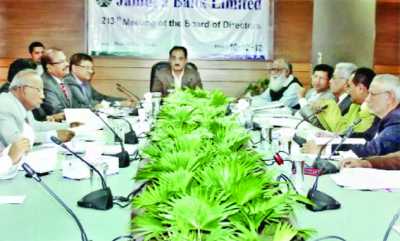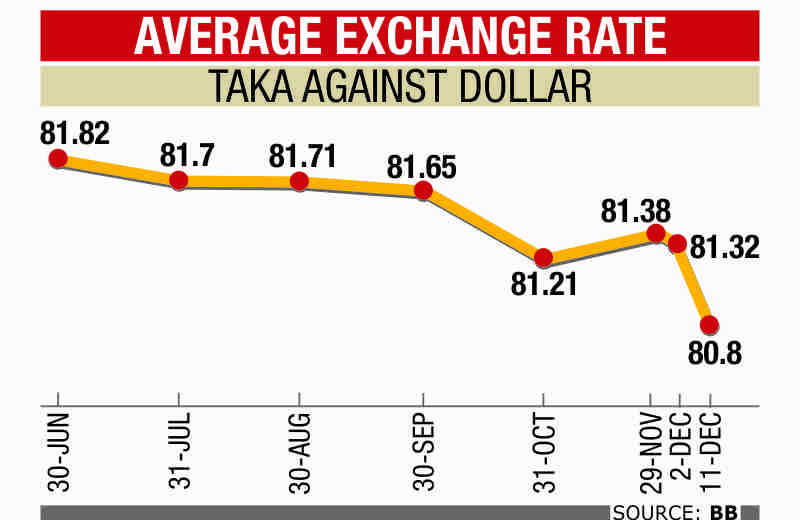Banking
Jamuna Bank Limited organised the 213th board meeting
 Md Mahmudul Hoque, Chairman of Jamuna Bank, presides over the 213th board meeting at the bank's head office in Dhaka recently.
Md Mahmudul Hoque, Chairman of Jamuna Bank, presides over the 213th board meeting at the bank's head office in Dhaka recently.
Jamuna Bank Limited organised the 213th board meeting at the bank's head office in Dhaka recently.
Md Mahmudul Hoque, Chairman of the board of directors of Jamuna Bank, presided over the meeting, said a press release.
Al-Haj Nur Mohammed, Chairman of Jamuna Bank Foundation, Engineer Md Atiqur Rahman, Chairman of Executive Committee of the bank, Golam Dastagir Gazi, Bir Portik, MP, Sakhawat Abu Khir Mohammad, Al-Haj Md Rezaul Karim Ansari, Fazlur Rahman, Engineer Mosharraf Hussain, Kanutosh Majumder, Gazi Golam Murtoza, Directors and Md Abul Shahjahan, Managing Director, attended the meeting.
News: The Daily Sun/Bangladesh/14th-Dec-12
BB buying dollar to keep rate stable
 The central bank is buying a large amount of dollars from the foreign exchange market almost every month to maintain stability of the exchange rate mainly because of a fall in import.
The central bank is buying a large amount of dollars from the foreign exchange market almost every month to maintain stability of the exchange rate mainly because of a fall in import.
A Bangladesh Bank official said the main target of the central bank is to ensure competitiveness of export commodities and to keep inflation under control.
The central bank has bought $1.82 billion from the forex market from July 1 to December 11. In the first 11 days of December, the amount was $107 million.
The BB is buying dollars in a way that does not fuel the appreciation of the taka against the dollar, said the official.
In the recent times, the taka has been appreciated continuously against the dollar. On December 11, the taka's weighted average rate against the dollar was Tk 80.80, down from Tk 81.32 on December 2.
The rates were Tk 81.38 on November 30 and Tk 81.82 on June 30.
Kazi Sayedur Rahman, general manager (forex reserve and treasury management department) of the central bank, said if the taka is appreciated much, export commodities may lose their competitiveness against the neighbouring countries.
He said the amount of foreign currency at banks often goes up beyond their limit as the demand for import is low now.
So the central bank buys the excess foreign currency from the banks, he added.
Another BB official said the central bank does not buy too much of the dollars as it can increase the supply of the local currency in the market and ultimately fuel inflation.
Several officials of the central bank and some commercial banks said the supply of the dollar has increased due to a fall in imports and a rise in remittances, exports and foreign aid disbursement.
The foreign exchange reserves also marked a rise in the recent times. The reserves stood at $12.11 billion yesterday, up from $10.36 billion on June 30.
According to BB statistics, imports fell by 6.75 percent in the July-October period of the current fiscal year compared to the same period last year, when imports rose by 23.13 percent.
Officials at some commercial banks said the overall imports fell this year due to a decline in imports of food grain, capital machinery and petroleum.
The BB officials said food import declined as the production of rice is good now.
The import of capital machinery was higher last year to feed the rental power plants but there is no such demand now. The prices of petroleum products also marked a fall on the international market, leading to a decline in the value of petroleum imports, they said.
Banks are opening letters of credit cautiously after the Hall-Mark scam. Also, many banks are deferring their import payments to next year.
The BB officials said Islamic Development Bank's credit line for import of petroleum is about $2.5 billion this fiscal year, much higher than $1 billion last year.
As a result, the payments against petroleum import by the local banks are less this year, which is also a reason behind the low demand for foreign currency.
According to LC settlement statistics of the first four months of the current fiscal year, imports of food grain fell by 43 percent, capital machinery by 28.16 percent and petroleum by 7.45 percent.
Also, remittances rose by more than 24 percent in the first five months of the current fiscal year. Though export growth was slow, it increased by 3 percent in the first four months.
News: The Daily Star/Bangladesh/14th-Dec-12
BB cuts ALS to mop up excess fund from market
The central bank has expedited its operations to mop up excess fund from the market using different monetary instruments for curbing inflationary pressure on the economy, officials said.
As part of the moves, the Bangladesh Bank (BB) Wednesday slashed assured liquidity support (ALS) for both primary dealer (PD) and non-PD banks, bypassing its previous directive.
Under the existing provisions, the PD and non-PD banks are allowed to enjoy liquidity support against both success and devolved securities for a maximum of two and a half months at a stretch from the date of issuance of government-approved securities.
"We've cut the ALS support slightly to withdraw excess liquidity from the market. But we have provided special repurchase agreement (repo) facility to both the PD and non-PD banks on the same day for complying with cash reserve requirement (CRR) of the central bank," a BB senior official told the FE.
He also said the central bank is using various monetary instruments in line with its latest monetary policy statement (MPS) to contain inflationary pressure on the economy.
On July 18, the BB unveiled its new half-yearly MPS, aiming to curb inflation further while ensuring adequate credit flow to the private sector for achieving 'inclusive' economic growth.
Both the PD and non-PD banks submitted requisition seeking Tk 14.57 billion as special repo in the late hours on the day to comply with the BB's CRR.
The central bank, however, accepted the special repo amounting to around Tk 9.0 billion, a PD said, adding that at least three private commercial banks may not be able to comply with the CRR.
Besides, the central bank is going to cut the tenure of ALS by 15 days - from the existing 75 days to 60 days, another BB official said.
"We're using the monetary tools to decrease the amount of reserve money (RM)," the central banker said.
News: The Daily Financial Express/Bangladesh/13th-Dec-12
HSBC became bank to drug cartels
In February 2008, Mexican authorities told the CEO of HSBC Holdings Plc’s Mexico unit that a local drug lord referred to the bank as the “place to launder money,” US prosecutors said on Tuesday, as they announced a record $1.92 billion settlement with the British bank. Lax money laundering controls at HSBC allowed two cartels - one each in Mexico and Colombia - to move $881 million in drug proceeds through the bank over the second half of the last decade, according to prosecutors and federal court documents.
So rampant was the practice, prosecutors said, that on some days drug traffickers deposited hundreds of thousands of dollars at HSBC Mexico accounts. To speed things along, the criminals even designed “specially shaped boxes” that fit the size of teller windows at HSBC branches, according to the documents.
Prosecutors said a multi-year, multi-agency probe into such transactions revealed how HSBC had degenerated into the “preferred financial institution” for drug traffickers and money launderers. And on Tuesday, that culminated in a far-reaching deferred prosecution agreement with HSBC.
An HSBC spokesman declined to discuss specific transactions or clients. But as part of the agreement, the bank acknowledged major lapses in compliance and ignoring red flags. It also acknowledged enabling clients to avoid US sanctions that prohibit dealings with countries such as Iran, Libya, Sudan, Myanmar and Cuba.
The bank agreed to take steps to fix problems, forfeit $1.256 billion, and retain a compliance monitor. It also agreed to pay $665 million in civil penalties to resolve regulatory actions by the US Office of the Comptroller of the Currency, the Federal Reserve, the Treasury Department and others.
“We accept responsibility for our past mistakes. We have said we are profoundly sorry for them, and we do so again. The HSBC of today is a fundamentally different organization from the one that made those mistakes,” HSBC Chief Executive Stuart Gulliver said.
The settlement, the largest penalty ever paid by a bank, had been expected.
In November, the bank told investors its penalty could exceed $1.5 billion. And many of the details of the bank’s lapses that allowed shadowy money to sluice through HSBC were contained in a US Senate investigative report in July.
HSBC shares closed up 0.6 percent in London on Tuesday, and its Hong Kong-listed shares were up about 0.25 percent by late morning on Wednesday.
Top US law-enforcement officials, standing sternly at a news conference in Brooklyn, New York, gave new details on Tuesday of how the bank was used. They pointed to flow charts decorated with green dollar bills showing how cartels used HSBC accounts to move money through Mexico, Colombia and elsewhere.
In one type of money-laundering transaction, the documents show how millions of dollars of drug money flowed through HSBC as Colombian drug cartels used the so-called Black Market Peso Exchange to convert US dollars to Colombian pesos.
In a multi-step laundering process, middlemen - referred to as peso brokers - used US dollars from drug cartels to buy consumer goods such as washing machines and then exported them to Colombia, where they were sold, according to the documents and a source familiar with the situation. Part of the sale proceeds, now in Colombian pesos, was then given back to the drug cartels, the documents show.
Other transactions involved Mexican drug cartels, prosecutors said. After the February 2008 meeting with Mexican authorities, HSBC conducted an internal inquiry that found a small number of Mexican clients accounted for a large percentage of the US dollars moving through HSBC, according to the documents, which include a “statement of facts” that HSBC has agreed to.
News: The Daily Independent/Bangladesh/13th-Dec-12
BB seeks support from municipality mayors to motivate SME entrepreneurs
Bangladesh Bank (BB) has sought support from mayors of municipalities across the country as part of its fresh move to identify small and medium entrepreneurs. “We’ve sent letter to mayors of municipalities Tuesday across the country requesting them to inform us about the real small entrepreneurs and industry cluster as the central bank is giving such entrepreneurs many incentives including advices and credit facilities,” said a central bank official.
Many small and medium entrepreneurs can easily take loan from banks but a good number of such entrepreneurs, especially those living in rural areas, are not availing this opportunity due to lack of information, the BB official added.
Earlier, the central bank sent letters to cambers and deputy commissioners across the country seeking their support about the small entrepreneurs.
Besides, the BB sent SMS (short message service) to subscribers of private cell-phone operators Grameen Phone and Airtel to inform them about the availability of bank loan for medium and small enterprise (SME).
“Entrepreneurs of the SME sector, especially those living in rural areas, borrow money at higher interest rate from rural lenders but banks are ready to give them loan with low interest.
We want to inform them about it,” said Sokomal Singha Chowdhury, general manager of the SME and Specialised Programmes Department.
“We’ll send letter to union parishad chairmen across the country seeking their support about it,” he added.
News: The Daily Independent/Bangladesh/13th-Dec-12



